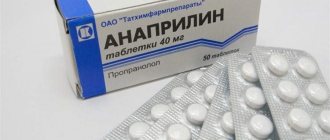Description of tablets "Concor"
"Concor" is a medication that is used to treat low blood pressure, sore throat, and also to normalize heart rhythm. The active ingredient is 2 compounds:
- Bisoprolol fumarate.
- Bisoprolol hemifumarate.
Available in the form of tablets, each of which contains 5 or 10 mg of the main component. Dispensed in pharmacies only with a prescription. Can be stored under normal conditions (at a temperature not exceeding 30 degrees) for the total shelf life (5 years from the date of production).
Contraindications
In some cases, taking the drug is prohibited:
- exacerbation of heart failure;
- a sharp decrease in pressure;
- cardiogenic shock;
- acidosis;
- intolerance to individual components, allergic reactions;
- bronchial asthma;
- blockade (sinoatrial and AV type).
The product is indicated for use only in adult patients. Children under the age of 17 inclusive are prohibited from using Concor. In this case, the pediatrician must develop a different course of therapy.
Attention!
Taking the product during pregnancy and breastfeeding (at any stage) is allowed, but with caution. There are no reported cases of complications, but therapy should be agreed with a doctor.
Concor®
Termination of therapy and “withdrawal syndrome”
You should not abruptly interrupt treatment with bisoprolol or change the recommended dose without first consulting your doctor, as this may lead to a temporary deterioration in heart function.
Treatment should not be interrupted suddenly, especially in patients with coronary artery disease (worsening attacks of angina pectoris, the development of myocardial infarction and the occurrence of ventricular arrhythmias in patients with coronary artery disease have been noted when taking beta-blockers suddenly). If discontinuation of treatment is necessary, the dose of bisoprolol should be reduced gradually. In case of significant worsening of angina or development of acute coronary syndrome, bisoprolol should be temporarily resumed.
Diseases for which the drug should be used with caution
Bisoprolol should be used with caution in the following cases:
- severe forms of COPD and non-severe forms of bronchial asthma;
- diabetes mellitus with significant fluctuations in blood glucose concentrations: bisoprolol may mask symptoms of hypoglycemia (a marked decrease in blood glucose concentrations), such as tachycardia, palpitations or increased sweating;
- strict diet;
— carrying out desensitizing therapy;
— atrioventricular block of the first degree;
- vasospastic angina (Prinzmetal's angina); cases of coronary spasm have been observed. Despite its high beta1 selectivity, angina attacks cannot be completely excluded when taking bisoprolol in patients with Prinzmetal's angina. You should take the drug with extreme caution;
- mild to moderate peripheral arterial circulation disorders (increased symptoms may occur at the beginning of therapy);
- psoriasis (including history).
Diseases of the cardiovascular system
Beta blockers should not be used in decompensated chronic heart failure until the patient's condition has stabilized.
At the initial stages of using bisoprolol, patients need constant monitoring.
Beta blockers may cause bradycardia. If the resting heart rate decreases to less than 50-55 beats/min, the dose should be reduced or discontinued taking bisoprolol.
Like other beta blockers, bisoprolol may cause a prolongation of the PQ interval on the ECG. Bisoprolol should be used with caution in patients with first degree atrioventricular block.
Non-selective beta-blockers may increase the frequency and duration of anginal attacks in patients with vasospastic angina (Prinzmetal's angina) due to alpha-receptor-mediated coronary artery vasoconstriction.
Cardioselective beta-blockers (including bisoprolol) should be used with caution in vasospastic angina.
To date, there is insufficient data regarding the use of bisoprolol in patients with CHF in combination with type 1 diabetes mellitus, severe renal and/or liver dysfunction, restrictive cardiomyopathy, congenital heart defects or heart valve disease with severe hemodynamic disturbances. Also, sufficient data have not yet been obtained regarding patients with CHF with myocardial infarction within the last 3 months.
Respiratory system
Despite the fact that selective beta-blockers have a lesser effect on the function of the respiratory system than non-selective beta-blockers, patients with chronic obstructive pulmonary disease COPD and mild forms of bronchial asthma should be prescribed bisoprolol with extreme caution and only if possible the benefits of its use outweigh the potential risks.
For bronchial asthma or COPD, simultaneous use of bronchodilators is indicated. In patients with bronchial asthma, there may be an increase in airway resistance, which requires a higher dose of beta2-agonists.
In patients with COPD, bisoprolol prescribed in combination therapy for the treatment of heart failure should be started at the lowest possible dose, and patients should be carefully monitored for the appearance of new symptoms (eg, shortness of breath, exercise intolerance, cough).
Major surgery and general anesthesia
If surgical interventions are necessary, the anesthesiologist should be warned that the patient is taking beta-blockers (risk of drug interactions with the development of severe bradyarrhythmias, reduction of reflex tachycardia and arterial hypotension). It is recommended not to stop taking bisoprolol in the perioperative period unless clearly necessary (since beta-adrenergic receptor blockade reduces the risk of arrhythmias and myocardial ischemia during induction of anesthesia and tracheal intubation).
If it is necessary to interrupt treatment with bisoprolol before surgery, the drug should be discontinued at least 48 hours before surgery.
Pheochromocytoma
In patients with pheochromocytoma, bisoprolol can only be prescribed while using alpha-blockers.
Thyrotoxicosis
With hyperthyroidism, beta-blockers (including bisoprolol) can mask tachycardia and reduce the severity of symptoms of thyrotoxicosis. Abrupt withdrawal of the drug can cause exacerbation of symptoms of the disease and the development of thyrotoxic crisis.
Hypersensitivity reactions
Beta blockers, including bisoprolol, may increase sensitivity to allergens and the severity of anaphylactic/hypersensitivity reactions due to decreased adrenergic compensatory regulation by beta blockers. The use of usual therapeutic doses of epinephrine (adrenaline) while taking beta-blockers does not always lead to achieving the desired clinical effect.
Caution should be exercised when prescribing bisoprolol to patients with a history of severe hypersensitivity reactions or undergoing desensitization.
Psoriasis
When deciding on the use of bisoprolol in patients with psoriasis, the expected benefits of the drug should be carefully weighed against the possible risk of exacerbation of psoriasis.
Contact lenses
Patients who use contact lenses should take into account that the use of beta-blockers may reduce the production of tear fluid.
Side effects
Side effects are rare, but they are not excluded:
- cramps, muscle weakness;
- bronchial asthma (exacerbation);
- sleep disorders;
- depressive states;
- headaches;
- dizziness;
- rarely – loss of consciousness;
- conjunctivitis;
- nausea;
- diarrhea;
- problems with potency;
- allergic reactions (itching, rashes, rhinitis of allergic origin).
Instructions for use of "Concor" tablets
The drug is started with a small dose - 5 mg per day. If necessary, it can be increased to 10 mg. If the patient suffers from high blood pressure or angina pectoris, a maximum amount of 20 mg per day can be taken. In case of chronic heart failure (without acute periods) – 10 mg.
"Concor" is taken as a primary or additional means. It is often used in conjunction with blockers of diuretics, cardiac glycosides, and ACE inhibitors. The course of treatment is long until the desired effect is achieved. Specific terms are not specified in the instructions, so the patient should consult a doctor before starting treatment.
Important!
During treatment, alcohol intake is completely contraindicated. If possible, you should reduce or quit smoking. In consultation with your doctor, you need to follow a certain diet.
Concor
The drug is taken orally 1 time/day. The tablets should be taken with a small amount of liquid in the morning before, during or after breakfast. The tablets should not be chewed or crushed into powder.
Arterial hypertension and stable angina
The dose is selected individually, primarily taking into account the heart rate and the patient’s condition.
As a rule, the initial dose is 5 mg 1 time / day. If necessary, the dose can be increased to 10 mg 1 time / day. For the treatment of arterial hypertension and angina pectoris, the maximum recommended dose is 20 mg 1 time / day.
Chronic heart failure
The standard treatment regimen for chronic heart failure includes the use of ACE inhibitors or angiotensin II receptor antagonists (in case of intolerance to ACE inhibitors), beta-blockers, diuretics and, optionally, cardiac glycosides. At the beginning of treatment of chronic heart failure with Concor®, a special titration phase is required under regular medical supervision.
The precondition for treatment with Concor® is stable chronic heart failure without signs of exacerbation.
Treatment with Concor® begins in accordance with the following titration scheme. Individual adaptation may be required depending on how well the patient tolerates the prescribed dose, i.e. the dose can only be increased if the previous dose was well tolerated.
To ensure an appropriate titration process, it is recommended to use bisoprolol in the dosage form of 2.5 mg tablets at the initial stages of treatment.
The recommended starting dose is 1.25 mg 1 time/day. Depending on individual tolerance, the dose should be gradually increased to 2.5 mg, 3.75 mg, 5 mg, 7.5 mg and 10 mg 1 time / day. Each subsequent dose increase should be carried out at least 2 weeks later. If increasing the dose of the drug is poorly tolerated by the patient, then a dose reduction is possible.
The maximum recommended dose for the treatment of chronic heart failure is 10 mg 1 time / day.
During titration, regular monitoring of blood pressure, heart rate and the severity of symptoms of chronic heart failure is recommended. Worsening of the symptoms of chronic heart failure is possible from the first day of using the drug.
If the patient does not tolerate the maximum recommended dose of the drug, then a gradual dose reduction should be considered.
During the titration phase or after it, a temporary worsening of chronic heart failure, arterial hypotension or bradycardia is possible. In this case, it is recommended, first of all, to adjust the doses of concomitant therapy drugs. It may also be necessary to temporarily reduce the dose of Concor® or discontinue it. After stabilization of the patient's condition, the dose should be re-titrated or treatment should be continued.
Duration of treatment for all indications
Treatment with Concor® is usually long-term.
Special patient groups
Patients with mild or moderate hepatic or renal dysfunction, as well as elderly patients, usually do not require dosage adjustment.
In case of severe renal impairment (creatinine clearance less than 20 ml/min) and in patients with severe liver disease, the maximum daily dose is 10 mg. Increasing the dose in such patients should be carried out with extreme caution.
Elderly patients do not require dose adjustment.
Because There is not enough data on the use of the drug Concor® in children; it is not recommended to prescribe the drug to children and adolescents under the age of 18 years.
To date, there is insufficient data regarding the use of Concor® in patients with chronic heart failure in combination with type 1 diabetes mellitus, severe renal and/or liver dysfunction, restrictive cardiomyopathy, congenital heart defects or heart valve disease with severe hemodynamic impairment. Also, sufficient data have not yet been obtained regarding patients with chronic heart failure with myocardial infarction within the last 3 months.
Overdose
Symptoms: most often - AV block, severe bradycardia, marked decrease in blood pressure, bronchospasm, acute heart failure and hypoglycemia. Sensitivity to a single high dose of bisoprolol varies widely among individual patients and sensitivity is likely to be high in patients with chronic heart failure.
Treatment: if an overdose occurs, first of all, it is necessary to stop taking the drug and begin supportive symptomatic therapy.
For severe bradycardia, intravenous administration of atropine. If the effect is insufficient, then a drug with a positive chronotropic effect can be administered with caution. Sometimes temporary placement of an artificial pacemaker may be necessary.
With a pronounced decrease in blood pressure, intravenous administration of plasma-substituting solutions and vasopressor drugs.
For AV blockade, constant clinical monitoring and prescription of beta-adrenergic agonists such as epinephrine. If necessary, install an artificial pacemaker.
In case of exacerbation of chronic heart failure - intravenous administration of diuretics, drugs with a positive inotropic effect, as well as vasodilators.
For bronchospasm - prescribing bronchodilators, incl. beta2-adrenergic agonists and/or aminophylline.
For hypoglycemia, intravenous administration of dextrose (glucose).
Cases of overdose
In case of overdose, there is a severe drop in blood pressure and other dangerous consequences:
- exacerbation of heart failure;
- hypoglycemia;
- bronchospasm;
- AV block;
- bradycardia.
Treatment is symptomatic, depending on the nature of the exacerbation. For example, to relieve the symptoms of bradycardia, atropine is administered, and in case of glycemia, a glucose solution is administered. If bronchospasm is observed, it is treated with Aminophylline. In case of a serious condition, it is necessary to call emergency assistance as quickly as possible.
Drug interactions
The drug is not recommended to be combined with medications such as Bisopropol. It leads to a decrease in the conductivity and contractility of the heart, which can lead to bradycardia. In turn, this will lead to vasodilation.
With caution, Concor is combined with drugs based on amiodarone and parasympathomimetic agents. If you use hypoglycemic drugs, their effect will increase. If used together with cardiac glycosides, symptoms of bradycardia will appear.
Parallel use of adrenergic agonists leads to an increase in blood pressure. If you use Mefloquine at the same time, this will again cause symptoms of bradycardia.
Hypertension
Few people in our time have not heard anything about hypertension, or high blood pressure. This is not surprising - after all, in the modern world, every third adult is faced with this problem and is forced to look for ways to solve it.
Blood pressure is considered elevated if its value is 140/90 mmHg. Art. or higher, regardless of the person's age. Most often, high blood pressure is an independent disease called hypertension. But sometimes hypertension is a symptom of some other disease (for example, kidney disease, thyroid disease, adrenal gland disease). In this case, in addition to reducing the numbers, the underlying disease must be treated.
special instructions
In some cases, there are no direct contraindications to the use of Concor. However, it should be taken with caution if you have the following disorders:
- following a strict diet (for example, after surgery, to correct weight);
- psoriasis;
- diabetes mellitus (if its course is accompanied by hypoglycemia);
- Prinzmetal's angina;
- AV block (first degree).
Concor® Cor
Termination of therapy and “withdrawal syndrome”
You should not abruptly interrupt treatment with bisoprolol or change the recommended dose without first consulting your doctor, as this may lead to a temporary deterioration in heart function. Treatment should not be interrupted suddenly, especially in patients with coronary artery disease (increased severity of angina attacks, the development of myocardial infarction and the occurrence of ventricular arrhythmias in patients with coronary artery disease with sudden cessation of beta-blockers have been noted). If discontinuation of treatment is necessary, the dose of bisoprolol should be reduced gradually. In case of significant worsening of angina or development of acute coronary syndrome, bisoprolol should be temporarily resumed.
Diseases for which the drug should be used with caution
Bisoprolol should be used with caution in the following cases:
- severe forms of COPD and non-severe forms of bronchial asthma;
- diabetes mellitus with significant fluctuations in blood glucose concentrations: bisoprolol may mask symptoms of hypoglycemia (a marked decrease in blood glucose concentrations), such as tachycardia, palpitations or increased sweating;
- strict diet;
— carrying out desensitizing therapy;
— atrioventricular block of the first degree;
- vasospastic angina (Prinzmetal's angina); cases of coronary spasm have been observed. Despite its high beta1 selectivity, angina attacks cannot be completely excluded when taking bisoprolol in patients with Prinzmetal's angina. You should take the drug with extreme caution;
- mild to moderate peripheral arterial circulation disorders (increased symptoms may occur at the beginning of therapy);
- psoriasis (including history).
Diseases of the cardiovascular system
Beta blockers should not be used in decompensated chronic heart failure until the patient's condition has stabilized.
At the initial stages of using bisoprolol, patients need constant monitoring.
Beta blockers may cause bradycardia. If the resting heart rate decreases to less than 50-55 beats/min, the dose should be reduced or discontinued taking bisoprolol.
Like other beta blockers, bisoprolol may cause a prolongation of the PQ interval on the ECG. Bisoprolol should be used with caution in patients with first degree atrioventricular block.
Non-selective beta-blockers may increase the frequency and duration of anginal attacks in patients with vasospastic angina (Prinzmetal's angina) due to alpha-receptor-mediated coronary artery vasoconstriction. Cardioselective beta1-blockers (including bisoprolol) should be used with caution in vasospastic angina.
To date, there is insufficient data regarding the use of bisoprolol in patients with CHF in combination with type 1 diabetes mellitus, severe renal and/or liver dysfunction, restrictive cardiomyopathy, congenital heart defects or heart valve disease with severe hemodynamic disturbances. Also, sufficient data have not yet been obtained regarding patients with CHF with myocardial infarction within the last 3 months.
Respiratory system
Despite the fact that selective beta-blockers have a lesser effect on the function of the respiratory system than non-selective beta-blockers, patients with chronic obstructive pulmonary disease COPD and mild forms of bronchial asthma should be prescribed bisoprolol with extreme caution and only if possible the benefits of its use outweigh the potential risks. For bronchial asthma or COPD, simultaneous use of bronchodilators is indicated.
In patients with bronchial asthma, there may be an increase in airway resistance, which requires a higher dose of beta2-agonists.
In patients with COPD, bisoprolol prescribed in combination therapy for the treatment of heart failure should be started at the lowest possible dose, and patients should be carefully monitored for the appearance of new symptoms (eg, shortness of breath, exercise intolerance, cough).
Major surgery and general anesthesia
If surgical interventions are necessary, the anesthesiologist should be warned that the patient is taking beta-blockers (risk of drug interactions with the development of severe bradyarrhythmias, reduction of reflex tachycardia and arterial hypotension). It is recommended not to stop taking bisoprolol in the perioperative period unless clearly necessary (since beta-adrenergic receptor blockade reduces the risk of arrhythmias and myocardial ischemia during induction of anesthesia and tracheal intubation). If it is necessary to interrupt treatment with bisoprolol before surgery, the drug should be discontinued at least 48 hours before surgery.
Pheochromocytoma
In patients with pheochromocytoma, bisoprolol can only be prescribed while using alpha-blockers.
Thyrotoxicosis
With hyperthyroidism, beta-blockers (including bisoprolol) can mask tachycardia and reduce the severity of symptoms of thyrotoxicosis. Abrupt withdrawal of the drug can cause exacerbation of symptoms of the disease and the development of thyrotoxic crisis.
Hypersensitivity reactions
Beta blockers, including bisoprolol, may increase sensitivity to allergens and the severity of anaphylactic/hypersensitivity reactions due to decreased adrenergic compensatory regulation by beta blockers. The use of conventional therapeutic doses of egschnephrine (adrenaline) while taking beta-blockers does not always lead to the achievement of the desired clinical effect.
Caution should be exercised when prescribing bisoprolol to patients with a history of severe hypersensitivity reactions or undergoing desensitization.
Psoriasis
When deciding on the use of bisoprolol in patients with psoriasis, the expected benefits of the drug should be carefully weighed against the possible risk of exacerbation of psoriasis.
Contact lenses
Patients who use contact lenses should take into account that the use of beta-blockers may reduce the production of tear fluid.



